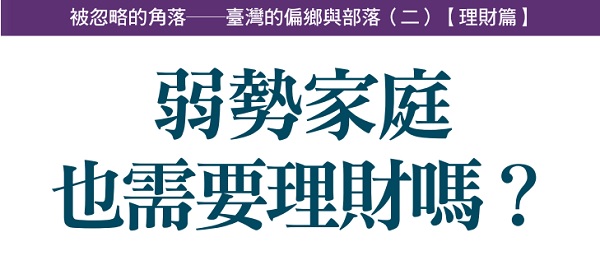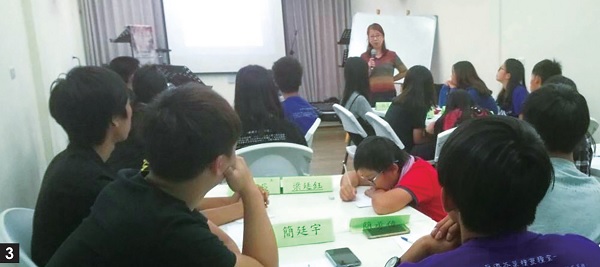Do disadvantaged families also need financial management?
【Financial Management】
Picture/Pan Huating

Preface
After reading my work "The Neglected Corner - Rural Areas and Tribes in Taiwan", a colleague said to me lovingly: "Hua Ting, do we have a lot of lunch boxes at home that we can send to rural children? So they can take lunch boxes to school. , and you can save money!" I stayed for a while, then responded with a wry smile: "A child who has a lunch box to bring means that he is in a healthy family. And the children and families we help have lost their normal functions, and they often If you don’t even have dinner, how can you bring a lunch box? If you bring a lunch box, won’t your classmates find out how poor they are when they open the lunch box?” The colleague replied sheepishly: “Hua Ting, I understand. We always do. We are accustomed to thinking about the needs of rural and disadvantaged children from our own perspective, but do not understand their real living conditions, so it is very likely that what we want to give may not be what these children and families need.”
is not that right? As I often share, many kind-hearted people have raised many beautiful coats, school bags, shoes, stationery supplies... These are also needed, but many children in rural areas need underwear, underwear and socks even more.

▲1-4 The author teaches the concept of financial management in the Starlight Class.
Factors causing rural poverty
The issues of poverty and disadvantage in rural areas are complex and multifaceted, and poverty cannot be eliminated by solving any one aspect. Over the years, I have traveled to rural areas, tribes and disadvantaged family groups in various parts of Taiwan, and I have discovered that there are many factors that cause poverty. Among them, I personally think the most critical ones are as follows:
1. Lack of local job opportunities, or low wages unable to cover family expenses.
2. Intergenerational upbringing problems caused by parents looking for jobs, and even language barriers between grandparents and grandchildren (many grandparents only speak the native language of the Aboriginal people, and the grandchildren only speak Mandarin or a little bit of their mother tongue).
3. Parents go out to work, and the children lack companionship and care since childhood.
4. Lack of correct health and health knowledge, and even abuse of patent medicines when sick, causing many medical problems. Furthermore, because it is located in a remote rural area, it is inconvenient to seek medical treatment. The local health unit is responsible for a wide area and cannot take full care of the patient, which aggravates the condition.
5. Parents’ educational level is generally low, and they are unable to provide their children with a broader perspective and advice. They are even unwilling for their children to continue their education. They hope that their children can work as soon as possible to help improve the family economy.
6. Parents are seriously divorced, remarried, or cohabiting, resulting in children who do not have a correct view of marriage and family.
7. Children lack the role models of their father and mother since they were young. They will not know how to run a marriage and get rich when facing marriage in the future, and they even lack a sense of responsibility.
8. I hope to get rich quickly, so gambling, drug abuse, etc. are serious.
9. Lack of correct concepts in the use of money, financial management, savings, risk planning, etc.
10. Simple personality, easy to trust people, often causing money losses and wrong investments.

Rural issues from a financial planner’s perspective
“Those who plan diligently will have plenty, but those who act hastily will come to want.” (Proverbs 21:5)
I remember once when I was teaching a "Workplace Soft Skills Course" for senior students from low-income households, extremely low-income households, marginal households and mentally handicapped households who were about to enter the workplace, I was shocked to find that there was a teaching lesson in the course arranged by the organizer. Their investment courses teach these students to invest in stocks and funds. I asked my classmates how they felt after taking the investment course, and almost all of them answered: "We are just poor, so we have to invest to have a chance to turn around. Saving money is too slow." This frightened me! What worries me is that these children invest in stocks and funds first without any concept of savings and risks. Without full understanding and homework, they invest money in the stock and fund markets. Most of them invest in stocks and funds. The result is that almost no one makes a profit, often losses occur, and debt and credit card debt abound.
A social worker from the Association for Helping Disadvantaged and Poor Families came to me specifically and said to me angrily: "Sister Hua Ting, why are there a group of people selling very cheap accident insurance with very low protection to these low-income households (only Compensation will only be paid after accidental death), and then tell them that they have good savings and investment plans. Although these families are poor, they still want to save and invest, so after constant lobbying, many people bought savings insurance or invested. , and paid premiums that exceeded their family budget. As a result, they all canceled the contract in the second and third years because they could not afford it, causing huge losses.”
The social worker asked me angrily: "Sister Hua Ting, although I don't know much about insurance and investment, I'm wondering why the salespeople don't plan complete accident insurance and medical insurance for these families? Accidental death The compensation money is a drop in the bucket and has no effect at all. Don’t the salesmen understand that these families are usually not worried about death, but the medical expenses caused by not dying? Incorrect financial planning will only make these families poorer, and our subsidies will make them even poorer. No matter how much you give, it’s never enough.”
When I was invited to teach classes for rural and disadvantaged families in various places, I really found that many families had done a lot of insurance and investment and financial planning, but they did not receive compensation when an accident or illness occurred.
Most of the reasons are that these families lack professional knowledge about insurance and investment, and easily trust the recommendations of relatives and friends. In addition, many insurance companies do not have professional training in tailor-made insurance planning, and most of them focus on savings and investment.
In addition, because Chinese people like to save, they worry that once they make a medical plan, if they don’t use it in the future, won’t the money be wasted? In this way, the most important medical and accident planning is neglected. Another situation is when you think you have a plan, only to discover that it is different from what you thought when something happens, leading to more serious poverty. (Please refer to my work, the talent section of Issue 50-55 of "Kingdom of God" magazine.)

The church lacks biblical financial teaching
“What is required of a steward is that he will be faithful.” (1 Corinthians 4:2)
When most church pastors teach about money, apart from tithing, the most common appeal is that money should not be discussed in the church. Therefore, brothers and sisters will not openly discuss the use, management and distribution of money. But not discussing it does not mean that everyone clearly understands how to use money according to biblical principles. There are more than 2,350 verses in the Bible that mention how to manage money and wealth. The Lord Jesus talked about money-related topics many times.
In the process of communicating with many church pastors and brothers and sisters about money service or estate planning, I found that they have wrong concepts about money. Not only do they fail to be good stewards of God's money, but many brothers and sisters, pastors, and preachers also have misconceptions about money. People have problems with debt and credit card debt.
The church lacks correct biblical concepts and teachings on financial management. Brothers and sisters have to deal with money in the world's way. They listen to many financial management and investment lectures to make various investments and financial plans. Whether they are in line with biblical principles and teachings is not so clear. Care!
I remember that in 2014, China Evangelical Theological Seminary held a Christian Economics Forum with the theme of "What to Leave for Children and Grandchildren", and invited pastors from various churches in Taiwan to participate. The author was honored to share the topic of "Family Planning Based on Biblical Principles" at the forum. In addition to sharing biblical financial views, the forum also specifically called for: Does the church have any plans for pastors’ medical care, pensions, etc.? Some pastors have been faithful pastors all their lives, but when they face retirement, they don’t even have a place to live. There are also many pastors and preachers whose lives are very difficult after retirement, not to mention facing illness or needing long-term care and recuperation.

Financial planning and care for rural pastors
In the process of serving churches and pastors in rural areas and with insufficient resources, I found that when pastors become sick or old, their quality of life, finances and medical care are lacking, which worries me. Helping faithful and committed pastors have a sound retirement life and medical care is a responsibility that every child of God should take seriously.
At present, in most cases, brothers and sisters contribute to pastors to pay for their medical and nursing expenses after retirement and when they are sick. Although this kind of love is touching, it is a huge expense. If pastors or churches can make correct insurance and financial planning in advance, they can reduce the burden on many church brothers and sisters and devote more to the church and the kingdom of God.
In Taiwan’s school curriculum from elementary school to university, there is no course on how to use money and financial management (even the accounting department teaches managing company accounts), and there are no courses on the biblical view of money and financial management in seminaries. Therefore, our concept of money comes from our family of origin. This is why it is said: "Rich people will get richer, and poor people will have less money."
In fact, even in big cities, most people lack correct financial concepts, let alone rural and disadvantaged families. Church pastors and preachers in remote and disadvantaged areas are often the ones that local residents and brothers and sisters seek help from, including the use of money.
What is depressing is that pastors in rural and disadvantaged areas, in addition to giving love and time, often have to give what they have and choose to give unconditionally in situations of inadequacy and scarcity.
If pastors themselves have knowledge and professional assistance such as insurance, financial management, and biblical concepts of money, etc., they can help local residents and brothers and sisters in the use of money, provide correct suggestions, and use biblical principles to teach how to use money. Manage and distribute money. In this way, pastors can not only help themselves, but also be a help to brothers, sisters and others in the church. Perhaps they can also be used more abundantly in the ministry of the church. What a wonderful thing this is! May God bless the pastors who serve disadvantaged families in rural areas and tribes.

Scriptures in the Bible related to financial management: (example)
‧ The rich rule over the poor; the debtor is the servant of the creditor. (Proverbs 22:7)
‧ What is required of a steward is that he be faithful. (1 Corinthians 4:2)
‧ Without consultation first, the plan will be ineffective; if there are many counselors, the plan will be successful. (Proverbs 15:22)
‧ Without wisdom, the people will fall; with many counselors, people will live in peace. (Proverbs 11:14)
‧ Wealth obtained without hard work will inevitably be consumed; those who work hard and save will surely increase. (Proverbs 13:11)
‧ He who plans diligently will have plenty; but whoever acts hastily will be in need. (Proverbs 21:5)
‧ A wise man hoards treasures and anointing oil in his house; but a fool swallows them as he comes. (Proverbs 21:20)
‧ But those who want to get rich fall into temptation, a snare, and many ignorant and harmful desires, causing people to sink into destruction and destruction. (1 Timothy 6:9)
‧ You must give it to seven people or to eight people, because you do not know what disaster will befall the earth in the future. (Ecclesiastes 11:2)
Pan Huating, CEO of the Seed Charity Association of the Republic of China, general manager of Gabriel International Wealth Management Consulting Co., Ltd., founder of Gabriel Saint Financial Team, CEO of Taiwan Aetna Insurance Brokers Company, and has an international financial planner and psychological counselor Certificate, and is a teacher at Joshua School of Management of the Chinese Boaz Association. He loves life and devotes himself wholeheartedly to domestic and foreign gospel ministries, serving the disadvantaged in rural areas and poverty alleviation projects. He also participates in the ministries of entrepreneurs achieving kingdom enterprises and the Great Commission, and using his life to influence lives.
